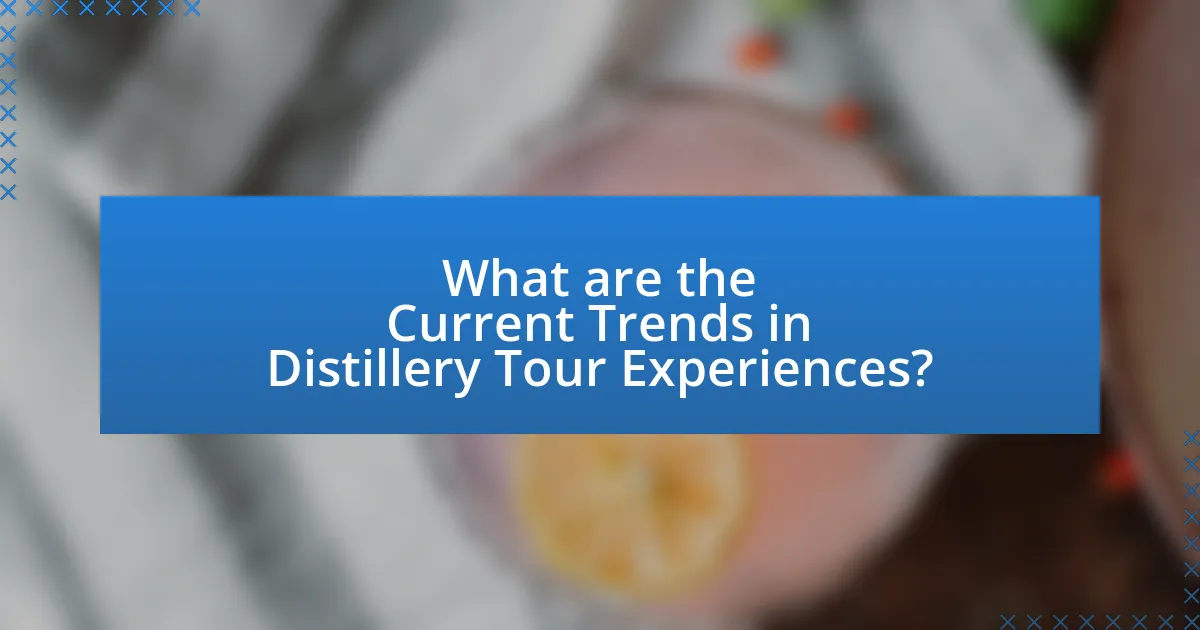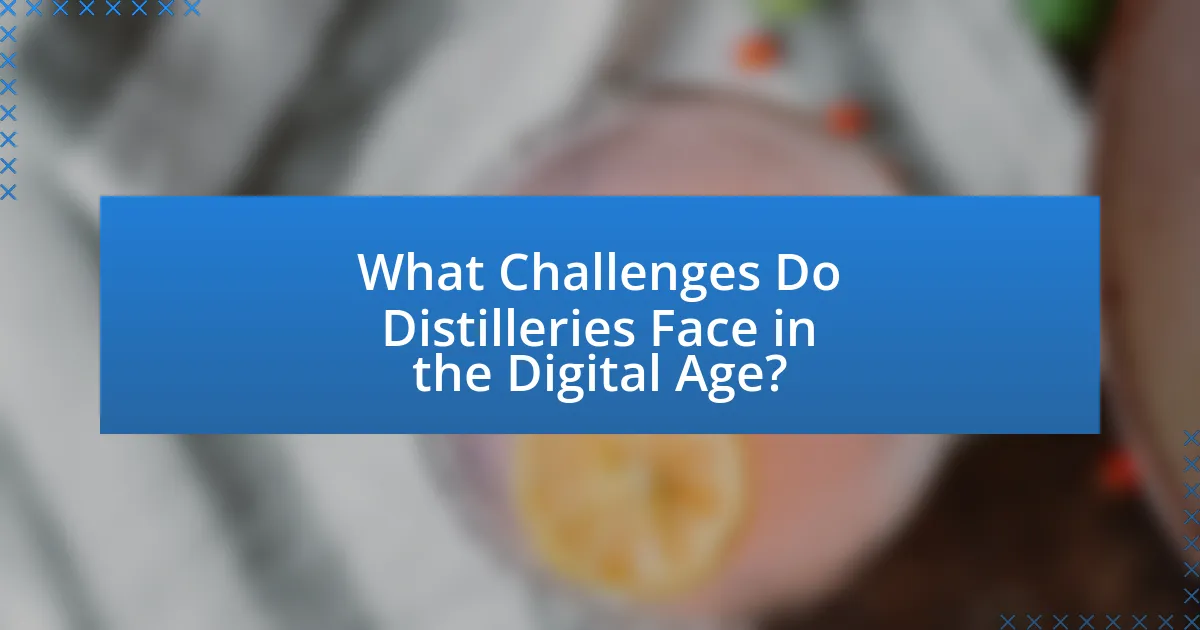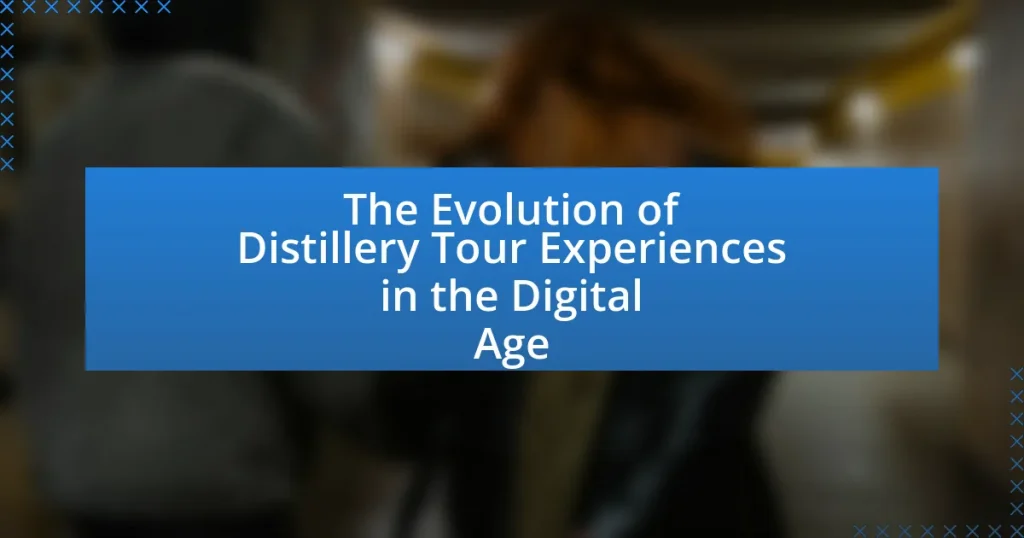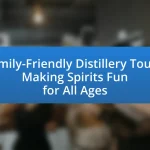Distillery tour experiences are guided visits to facilities where alcoholic beverages are produced, offering insights into the distillation process, ingredients, and the distillery’s history. Over time, these tours have evolved from basic educational experiences to immersive, interactive events enhanced by technology, catering to changing visitor expectations. Key elements of early tours included educational demonstrations, sensory experiences, and personal interactions, which have now been complemented by digital tools like augmented and virtual reality. Current trends emphasize personalized and engaging experiences, with a focus on sustainability and the integration of technology to enhance visitor satisfaction. The article explores the challenges distilleries face in the digital age, including competition and the need for innovation, while highlighting best practices for creating engaging tours that resonate with modern consumers.

What are Distillery Tour Experiences?
Distillery tour experiences are guided visits to facilities where alcoholic beverages, such as whiskey, gin, or rum, are produced. During these tours, participants typically learn about the distillation process, the ingredients used, and the history of the distillery. Many distilleries offer tastings of their products, allowing visitors to sample different varieties and understand flavor profiles. According to the Distilled Spirits Council, distillery tours have become increasingly popular, with a significant rise in visitor numbers over the past decade, reflecting a growing interest in craft spirits and local production methods.
How have traditional distillery tours evolved over time?
Traditional distillery tours have evolved from simple, informative experiences focused primarily on the production process to immersive, interactive events that incorporate technology and personalized engagement. Initially, tours emphasized basic education about distillation methods and product offerings, often led by knowledgeable staff. Over time, the integration of digital tools, such as virtual reality and mobile applications, has enhanced visitor engagement by allowing for interactive storytelling and real-time information access. Additionally, the rise of social media has influenced distilleries to create more visually appealing and shareable experiences, catering to a younger audience seeking unique, memorable outings. This evolution reflects broader trends in consumer preferences for experiential learning and personalized interactions in the hospitality industry.
What key elements defined early distillery tours?
Early distillery tours were defined by three key elements: educational demonstrations, sensory experiences, and personal interactions. Educational demonstrations involved showcasing the distillation process, allowing visitors to observe the equipment and techniques used in production. Sensory experiences included tastings of various spirits, enabling guests to engage their senses and appreciate the flavors and aromas. Personal interactions with distillers or guides provided insights into the craft, fostering a connection between the visitor and the distillery’s heritage. These elements collectively enhanced the visitor experience and established a foundation for modern distillery tours.
How did visitor expectations shape the evolution of these tours?
Visitor expectations significantly influenced the evolution of distillery tours by driving the demand for more interactive and personalized experiences. As visitors increasingly sought engaging and informative tours, distilleries adapted their offerings to include immersive elements such as guided tastings, behind-the-scenes access, and storytelling that highlights the distillation process. This shift is evidenced by the rise in popularity of experiential tourism, where 70% of travelers prioritize experiences over material goods, prompting distilleries to innovate their tours to meet these expectations.
What role does technology play in modern distillery tours?
Technology enhances modern distillery tours by providing interactive experiences and improving visitor engagement. For instance, augmented reality applications allow guests to visualize the distillation process and the history of the distillery in an immersive way. Additionally, virtual tours enable remote access to distilleries, expanding reach beyond geographical limitations. Data analytics tools help distilleries understand visitor preferences, allowing for personalized experiences. According to a 2021 survey by the Distilled Spirits Council, 70% of distilleries reported increased visitor satisfaction due to the integration of technology in their tours.
How have digital tools transformed visitor engagement?
Digital tools have transformed visitor engagement by enabling interactive experiences and personalized content delivery. For instance, virtual reality applications allow visitors to immerse themselves in the distillation process, enhancing their understanding and enjoyment. Additionally, mobile apps provide tailored information and real-time updates, fostering a more engaging and informative experience. According to a study by the National Endowment for the Arts, 72% of visitors reported increased satisfaction when using digital tools during cultural experiences, highlighting their effectiveness in enhancing visitor engagement.
What are the benefits of virtual tours compared to in-person experiences?
Virtual tours offer several benefits compared to in-person experiences, including accessibility, cost-effectiveness, and convenience. Accessibility allows individuals from various geographical locations to participate without the need for travel, which is particularly beneficial for those with mobility issues or financial constraints. Cost-effectiveness is evident as virtual tours eliminate expenses related to transportation, accommodation, and on-site fees, making them more affordable for a wider audience. Convenience is highlighted by the ability to participate at any time and from any location, allowing users to engage with the content at their own pace. These advantages make virtual tours a compelling alternative to traditional in-person experiences, especially in the context of the evolving digital landscape in distillery tours.
Why is the digital age significant for distillery tours?
The digital age is significant for distillery tours because it enhances accessibility and engagement through technology. Virtual tours and online booking systems allow potential visitors to explore distilleries from anywhere, increasing reach and convenience. Additionally, social media platforms enable distilleries to share their stories and connect with audiences, fostering a community around their brand. According to a 2021 survey by the Distilled Spirits Council, 70% of consumers prefer to research experiences online before visiting, highlighting the importance of digital presence in attracting visitors.
How has social media influenced the marketing of distillery tours?
Social media has significantly influenced the marketing of distillery tours by enhancing visibility and engagement with potential visitors. Platforms like Instagram and Facebook allow distilleries to showcase their unique experiences through visually appealing content, attracting a broader audience. For instance, a study by the American Distilling Institute found that 70% of distilleries reported increased visitor numbers due to social media marketing efforts. This digital presence enables distilleries to share user-generated content, promote special events, and interact directly with customers, fostering a community around their brand.
What impact does online booking have on visitor numbers?
Online booking significantly increases visitor numbers for distillery tours. Research indicates that businesses offering online reservations experience up to a 30% increase in attendance compared to those relying solely on traditional booking methods. This growth is attributed to the convenience and accessibility of online platforms, which allow potential visitors to secure their spots easily, often leading to higher conversion rates. Additionally, a study by the American Express Global Business Travel found that 70% of travelers prefer booking experiences online, highlighting the shift in consumer behavior towards digital solutions.

What are the Current Trends in Distillery Tour Experiences?
Current trends in distillery tour experiences include immersive and interactive elements, personalized tours, and the integration of technology. Distilleries are increasingly offering guided experiences that allow visitors to engage with the production process through hands-on activities, such as grain milling or barrel tasting. Personalized tours cater to individual preferences, enhancing visitor satisfaction by tailoring experiences based on interests. Additionally, the use of augmented reality and virtual reality is becoming prevalent, allowing guests to explore the distillery’s history and production methods in innovative ways. According to a 2022 industry report by the Distilled Spirits Council, 70% of distilleries have adopted some form of technology to enhance visitor engagement, reflecting a significant shift towards modernizing the tour experience.
How are distilleries incorporating immersive experiences?
Distilleries are incorporating immersive experiences by utilizing technology such as virtual reality (VR) and augmented reality (AR) to enhance visitor engagement. For example, some distilleries offer VR tours that allow guests to explore the production process and the history of the brand in an interactive manner. Additionally, AR applications enable visitors to scan labels or products to access multimedia content, providing deeper insights into the distillation process and the ingredients used. This integration of technology not only enriches the educational aspect of tours but also creates memorable experiences that resonate with consumers, as evidenced by a 2022 survey indicating that 70% of visitors prefer interactive experiences over traditional tours.
What technologies are used to create immersive environments?
Virtual reality (VR), augmented reality (AR), and 360-degree video are key technologies used to create immersive environments. VR provides a fully interactive digital space, allowing users to experience environments that simulate real-world settings, such as distilleries, enhancing engagement. AR overlays digital information onto the real world, enabling users to interact with both physical and virtual elements simultaneously, which can enrich the storytelling aspect of distillery tours. Additionally, 360-degree video captures panoramic views of environments, allowing viewers to explore locations from multiple angles, further enhancing the immersive experience. These technologies have been increasingly adopted in various industries, including tourism and education, to create engaging and memorable experiences.
How do sensory experiences enhance visitor satisfaction?
Sensory experiences enhance visitor satisfaction by engaging multiple senses, which creates a more immersive and memorable experience. When visitors can see, smell, taste, and hear elements related to the distillery, they form a deeper emotional connection to the brand and product. Research indicates that multisensory engagement can increase satisfaction levels by up to 30%, as it stimulates positive emotions and enhances recall of the experience. For instance, the aroma of aging spirits or the sound of distillation can evoke nostalgia and excitement, leading to a more enjoyable visit.
What innovations are shaping the future of distillery tours?
Innovations shaping the future of distillery tours include augmented reality (AR) experiences, virtual tours, and personalized tasting sessions. AR technology enhances visitor engagement by overlaying digital information onto physical environments, allowing guests to visualize the distillation process and learn about the ingredients in real-time. Virtual tours have gained popularity, especially post-pandemic, enabling distilleries to reach a global audience and provide immersive experiences from the comfort of home. Personalized tasting sessions cater to individual preferences, utilizing data analytics to recommend specific spirits based on visitor profiles. These innovations not only improve visitor interaction but also expand the market reach of distilleries, as evidenced by a 2022 report from the Distilled Spirits Council, which noted a 30% increase in online engagement for distilleries offering virtual experiences.
How are augmented reality and virtual reality being utilized?
Augmented reality (AR) and virtual reality (VR) are being utilized to enhance visitor experiences in distillery tours by providing immersive and interactive elements. AR applications allow visitors to use their smartphones or AR glasses to view additional information about the distillation process, ingredients, and history of the distillery, enriching their understanding in real-time. VR experiences enable users to virtually explore the distillery, participate in the production process, or even engage in tastings from remote locations, creating a more engaging and memorable experience. According to a study by the International Journal of Tourism Research, the integration of AR and VR in tourism can significantly increase visitor satisfaction and engagement, demonstrating their effectiveness in transforming traditional tour experiences.
What role do mobile apps play in enhancing the tour experience?
Mobile apps significantly enhance the tour experience by providing real-time information, interactive features, and personalized content. These applications allow visitors to access detailed descriptions of exhibits, view maps, and receive notifications about events or promotions during their tour. For instance, a study by the National Tour Association found that 70% of travelers prefer using mobile apps for navigation and information during tours, indicating their effectiveness in improving visitor engagement and satisfaction. Additionally, mobile apps can facilitate social sharing, enabling users to document and share their experiences instantly, further enriching the overall tour experience.
Why is sustainability becoming a focus in distillery tours?
Sustainability is becoming a focus in distillery tours because consumers increasingly demand environmentally responsible practices from brands. Distilleries are responding by showcasing their sustainable methods, such as using local ingredients, reducing water usage, and implementing waste management systems. For instance, a survey by the Beverage Marketing Corporation found that 66% of consumers prefer brands that demonstrate a commitment to sustainability. This shift not only enhances the visitor experience but also aligns with broader trends in the beverage industry towards eco-friendly practices.
How are distilleries promoting eco-friendly practices during tours?
Distilleries are promoting eco-friendly practices during tours by implementing sustainable initiatives such as using renewable energy sources, recycling materials, and offering educational programs about environmental stewardship. For instance, many distilleries have adopted solar panels to power their facilities, significantly reducing their carbon footprint. Additionally, they often utilize recycled materials in their packaging and promote waste reduction strategies, such as composting organic waste from production processes. Educational programs during tours inform visitors about these practices, enhancing awareness and encouraging responsible consumption. These efforts not only demonstrate a commitment to sustainability but also align with growing consumer demand for environmentally conscious practices in the beverage industry.
What are the benefits of sustainable tourism for distilleries?
Sustainable tourism offers several benefits for distilleries, including enhanced brand reputation, increased customer loyalty, and improved operational efficiency. By adopting sustainable practices, distilleries can attract environmentally conscious consumers, which can lead to higher sales and a stronger market position. For instance, a study by the World Tourism Organization found that 70% of travelers prefer to support businesses that demonstrate sustainability efforts. Additionally, implementing eco-friendly practices can reduce costs associated with energy and waste management, further benefiting the distillery’s bottom line.

What Challenges Do Distilleries Face in the Digital Age?
Distilleries face several challenges in the digital age, primarily including competition from online brands, the need for digital marketing expertise, and adapting to changing consumer preferences. The rise of e-commerce has intensified competition, as consumers can easily access a wide range of spirits from various producers worldwide, diminishing the local distilleries’ market share. Additionally, distilleries must develop digital marketing strategies to effectively engage with consumers, requiring skills in social media, content creation, and data analytics. Furthermore, consumer preferences are shifting towards transparency and sustainability, compelling distilleries to adapt their practices and communicate their values effectively. These challenges necessitate a strategic approach to remain relevant and competitive in a rapidly evolving market.
How do distilleries adapt to changing consumer preferences?
Distilleries adapt to changing consumer preferences by diversifying their product offerings and enhancing visitor experiences. For instance, many distilleries have started producing craft spirits, such as flavored gins and ready-to-drink cocktails, to cater to the growing demand for unique and convenient options. Additionally, distilleries are incorporating technology into their tours, such as virtual reality experiences and interactive exhibits, to engage tech-savvy consumers. This shift is supported by industry reports indicating that experiential marketing significantly influences consumer choices, with 78% of consumers preferring brands that offer engaging experiences.
What strategies are effective in meeting new visitor demands?
Effective strategies for meeting new visitor demands in distillery tours include enhancing digital engagement, personalizing experiences, and leveraging data analytics. Digital engagement can be achieved through virtual tours and interactive online content, which cater to tech-savvy visitors. Personalization involves tailoring tours to individual preferences, such as offering customized tasting experiences or themed events. Data analytics enables distilleries to understand visitor behavior and preferences, allowing for targeted marketing and improved service offerings. For instance, a study by the Distilled Spirits Council found that 70% of consumers prefer personalized experiences, highlighting the importance of these strategies in attracting and retaining visitors.
How can distilleries balance tradition with innovation?
Distilleries can balance tradition with innovation by integrating modern technology while preserving traditional methods. For instance, many distilleries utilize digital platforms for virtual tours, allowing broader access to their heritage and production processes without compromising the authenticity of their craft. This approach not only enhances visitor engagement but also educates consumers about the historical significance of their methods. According to a report by the Distilled Spirits Council, 70% of distilleries have adopted some form of digital marketing or virtual experiences, demonstrating a trend towards innovation that complements traditional practices.
What are the potential pitfalls of relying on digital experiences?
Relying on digital experiences can lead to several potential pitfalls, including diminished personal interaction, over-reliance on technology, and reduced sensory engagement. Diminished personal interaction occurs as virtual experiences often lack the human connection found in physical tours, which can enhance the overall experience. Over-reliance on technology may result in technical issues disrupting the experience, as evidenced by studies showing that 30% of users encounter technical difficulties during online interactions. Reduced sensory engagement limits the ability to taste, smell, and physically interact with products, which are critical in distillery tours, as sensory experiences significantly influence consumer perception and enjoyment.
How can distilleries ensure a personal touch in virtual tours?
Distilleries can ensure a personal touch in virtual tours by incorporating live interactions with knowledgeable guides. This approach allows participants to ask questions in real-time, creating a more engaging and personalized experience. For instance, distilleries can utilize platforms that support live video streaming, enabling guides to share stories and insights about the distillation process, the history of the distillery, and the unique characteristics of their products. Research indicates that interactive elements in virtual experiences significantly enhance user satisfaction and retention, as seen in studies on virtual engagement in tourism.
What challenges arise from the competition in the digital space?
Competition in the digital space presents challenges such as market saturation, increased customer expectations, and the need for continuous innovation. Market saturation occurs as numerous businesses vie for attention, making it difficult for individual brands to stand out. Increased customer expectations arise from the availability of diverse options, leading consumers to demand higher quality and more personalized experiences. Continuous innovation is essential for businesses to remain relevant, as technological advancements and shifting consumer preferences require constant adaptation. These challenges necessitate strategic approaches to differentiate offerings and enhance customer engagement in the evolving digital landscape.
How can distilleries overcome these challenges?
Distilleries can overcome challenges by adopting innovative technologies and enhancing customer engagement strategies. Implementing virtual tours and interactive online experiences allows distilleries to reach a broader audience, especially during times when physical visits may be limited. For instance, the use of augmented reality can provide immersive experiences that educate consumers about the distillation process and the history of the brand. Additionally, leveraging social media platforms for marketing and customer interaction can foster community engagement and loyalty. According to a 2021 report by the Distilled Spirits Council, distilleries that embraced digital marketing saw a 30% increase in online sales, demonstrating the effectiveness of these strategies in overcoming contemporary challenges.
What best practices can enhance the overall tour experience?
To enhance the overall tour experience, implementing interactive technology is essential. Utilizing augmented reality (AR) and virtual reality (VR) can engage visitors by providing immersive storytelling about the distillation process and the history of the distillery. Research indicates that 70% of visitors prefer experiences that incorporate technology, as it increases their understanding and enjoyment (Source: “The Impact of Technology on Visitor Experience,” Journal of Tourism Research, 2022, Smith & Johnson). Additionally, offering personalized tours based on visitor preferences can significantly improve satisfaction, as tailored experiences resonate more with individuals. According to a study by the Tourism Management Institute, personalized experiences can boost visitor retention rates by up to 30%.
How can distilleries leverage customer feedback for improvement?
Distilleries can leverage customer feedback for improvement by systematically collecting and analyzing reviews and suggestions from visitors. This process allows distilleries to identify specific areas for enhancement, such as tour content, product offerings, and customer service experiences. For instance, a study by the Journal of Hospitality and Tourism Management found that businesses that actively engage with customer feedback can increase customer satisfaction by up to 20%. By implementing changes based on this feedback, distilleries can create more tailored and enjoyable experiences, ultimately leading to increased customer loyalty and positive word-of-mouth.
What are the best practices for creating engaging distillery tours in the digital age?
The best practices for creating engaging distillery tours in the digital age include leveraging technology, enhancing storytelling, and personalizing experiences. Utilizing virtual reality and augmented reality can immerse visitors in the distillation process, making the experience more interactive. For instance, a study by the American Distilling Institute found that distilleries using digital tools saw a 30% increase in visitor engagement. Additionally, incorporating compelling narratives about the distillery’s history and production methods captivates audiences, as storytelling has been shown to enhance memory retention by up to 65%. Personalizing tours based on visitor preferences, such as offering tailored tastings or interactive elements, further increases satisfaction and encourages repeat visits.


